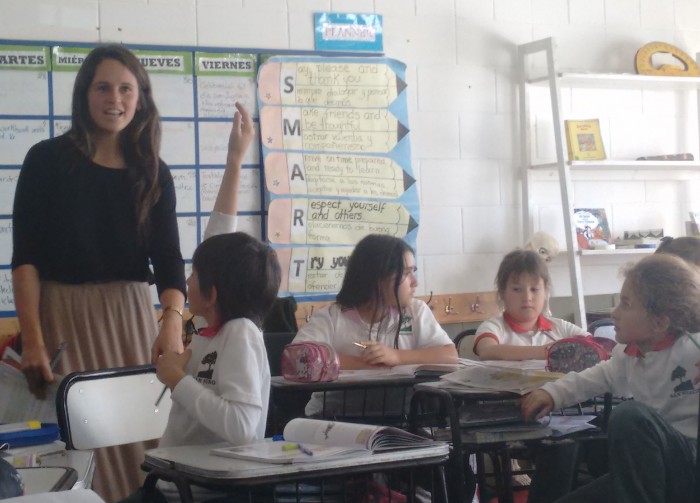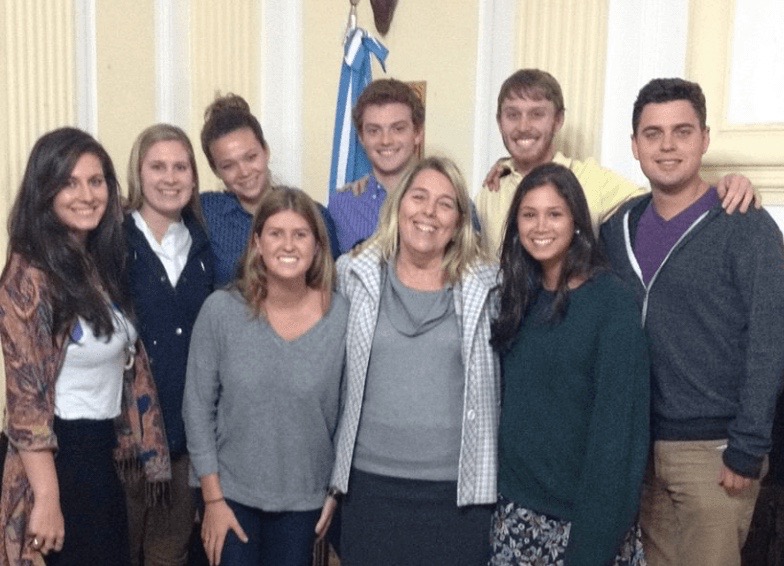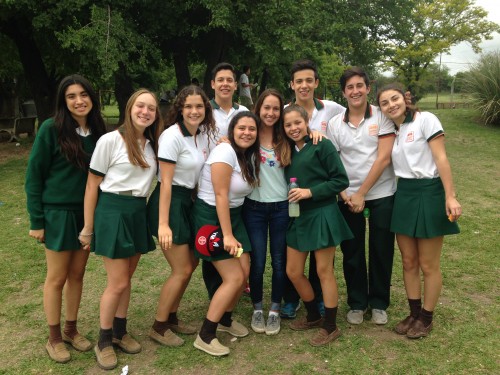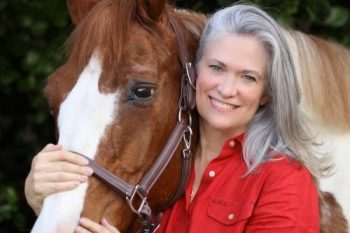After she graduated last May, Katie Morell (’15) moved to a remote farm in Argentina that she shares with 38 sheep, 17 chickens and assorted dogs, cats and rabbits. It’s not your typical destination for a recent college graduate, but Morell wasn’t looking for a typical just-out-of-college job.
She’s one of five alumni who are teaching English at schools in Argentina this fall through a program called Connecting Schools to the World. Alumna Cristina Rapela (’71) founded the program to connect recent U.S. college graduates with schools in her native country.
Participants live with local families and teach English for a semester in a bilingual school while they improve their Spanish language skills and learn how to teach English as a second language. Eight Wake Forest graduates participated last year.

Katie Morell ('15) teaching in her classroom.
Morell, an elementary education major, knew almost no Spanish when she arrived in July for her six-month teaching assignment. She lives with a family of four on a farm in the small city of Rio Cuarto, about eight hours from Buenos Aires, and teaches English to students from first grade through high school. She hopes to eventually teach in a low-income school in the U.S. that serves students from Spanish-speaking backgrounds.
“I came to Argentina with the expectations of learning Spanish and building connections while practicing different teaching techniques,” Morell said. “I have had incredible and once-in-a-lifetime experiences that have given me a deep appreciation of the Argentine culture .… The connections I thought that I would make have turned into deep, meaningful relationships with people that I imagine I will remain close with for the rest of my life.”
Rapela’s family has long connections to Wake Forest and still has close ties to Winston-Salem. Rapela moved to Winston-Salem as a child when her father, Dr. Carlos Rapela, was hired as a physiology professor at the School of Medicine. After graduating from Wake Forest, she returned to Argentina and ran an English language-learning center. One of her sisters, Cecilia Rapela Silva (’74), is the founder and headmaster of Northern Hills Bilingual School in Mar del Plata, Argentina, which has an exchange program with high schools in Winston-Salem. Another sister teaches in a Winston-Salem school.

Cristina Rapela (front row center) with the 2014 Wake Forest graduates who participated in Connecting Schools last year: Front row, Molly Kirkpatrick and Melissa Smith; and back row, left to right, Marissa Quintero, Hillary Rossi, Ella Ruffel, Ben Smith, Nate Brickhouse and Kyle Maloy.<br /> <br />
Rapela started Connecting Schools in 2007. The program is for any recent college graduate who’s passionate about teaching in a different country, not just Spanish or education majors. Thirteen recent college graduates are in the program this fall, including graduates from Duke, Notre Dame, Georgia, Rhodes College, the University of Texas at Austin and University of Colorado at Boulder
Participants receive two weeks of intensive Spanish language lessons when they arrive in Argentina, followed by weekly Spanish lessons. They also receive classroom management training before being placed with a local family and beginning their teaching assignments. The program costs $2,000.
Rapela was at Wake Forest in October to promote Connecting Schools. “Wake Forest alumni have a lot of experience in study-abroad programs and travel,” she said. “They realize how much they can grow as a person doing something like this. Since Wake Forest is such a strong liberal arts college, students have been taught to be creative thinkers; I’ve had some wonderful teachers who had no experience teaching.”

Chloe Evans-Cross (’15) with some of her students.
The five alumni now in the program — Morell, Chloe Evans-Cross (’15), Kurt Nugent (’15), Ann Hollingsworth (’15) and Ashlee Rusk (’15) — are finishing their teaching assignments this month. “One of the most important lessons I have learned is the taste of another culture,” said Evans-Cross, a communication major who’s teaching English at a private school with students from fifth grade through high school and at an orphanage.
Evans-Cross said she’s not sure of her long-term career goals, but she’s interested in education reform or working in a school that serves underprivileged students. Her experience in Argentina taught her how to teach English and how to adapt to living in another country, she said.
“From figuring out how to get across town when the bus doesn’t show, to hearing that classes are canceled as soon as you arrive at school, the rhythm of Argentina has reminded me … that if your original plan doesn’t work, there is always another option, and sometimes it turns out to be a much better one.”


